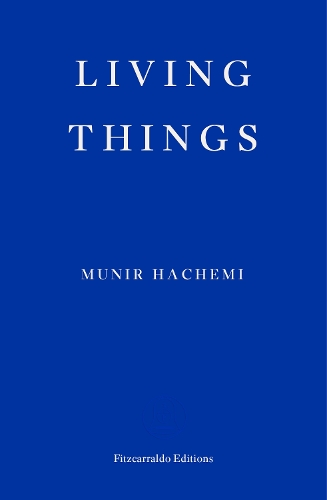
Living Things
(Paperback)
Publishing Details
Living Things
By (Author) Munir Hachemi
Translated by Julia Sanches
Fitzcarraldo Editions
Fitzcarraldo Editions
17th September 2024
20th June 2024
United Kingdom
Classifications
General
Fiction
Fiction in translation
Physical Properties
Paperback
120
Width 125mm, Height 197mm
Description
Living Things follows four recent graduates - Munir, G, Ernesto and lex - who travel from Madrid to the south of France to work the grape harvest. Except things don't go as planned: they end up working on an industrial chicken farm and living on a campsite, where a general sense of menace takes hold. What follows is a compelling and incisive examination of precarious employment, capitalism, immigration and the mass production of living things, all interwoven with the protagonist's thoughts on literature and the nature of storytelling. A genre-bending and dystopian eco-thriller, Living Things is a punk-like blend of Roberto Bolao's The Savage Detectives and Samanta Schweblin's Fever Dream, heralding an exciting new voice in international fiction.
Reviews
Living Thingsdips blithely in and out of genres and packsmore ideas in its lean frame than seems possible. Its a novelposing as a journal posing as a meditation on the functionof the journal that playfully interrogates form and contentin art, what it means to write, and what it means to careor not care about anything, or about everything. MunirHachemi is a magician, and his marvellous book, deftlytranslated by Julia Sanches, defies adequate description.
James Greer, author ofBad Eminence
Startling, compulsive, and vibrant;Living Thingsreads like an ignition. The most honest thing Ive read in a long time about being young and alive in a beautiful, horrible world.
Dizz Tate, author ofBrutes
A sinister, suspenseful novel,Living Thingsexposes how the biotech industry will take the foundations of life and mutilate them into things untrustworthy as triffids. Hachemi wrangles form itself, making a sci-fi of what is ultimately extremely quotidian and true: Frankenstein creatures created as fodder to feed an increasingly undernourished world, and the refracted suffering that upholds such a system, in which living things worker, plant and animal are made consumable parts in helix. Hachemi deftly lays bare the cannibalistic bent at the heart of global capitalism.
Abi Andrews, author ofThe Word for Woman is Wilderness
Heady, diaristic and compulsively readable in Julia Sanchess perfect translation, four reckless and stubborn college students get themselves caught in the hell of factory farming in Southern France. To say thatLiving Thingsis a superb eco-thriller is both true and yet falls short of just how magnificently unclassifiable Hachemis novel is.
Jacob Rogers, The Center for Fiction
Living Thingsis a short novel that changes its skin and almost its genre in each of its seven parts ... A work of autofiction that not only defines the self against lived and narrated experience, but also functions as an indictment of social, political, economic and health systems ... [T]he fact that this all happened to the author affects us not only as readers, but as human beings.
Carlos Zann,El Pas
From the outset [ofLiving Things], the first person narration is interwoven with a multitude of meta-literary and philosophical reflections that eventually form a rich second skin, a subterranean engine through which the real story, beyond the descriptions of escapades and setbacks, begins to be understood. A magnificent debut.
Eugenio Fuentes,La Nueva Espaa
Hachemi counterbalances the uneasy atmosphere with a constant, subtle underlying humour that feels like a burst of fresh air. Absurdity and latent danger, stirred up in a French heatwave by the nave insouciance of a group of increasingly tense youths, create an absorbing, somewhat Kafkaesque mood ... [Hachemi] weaves a delicately disturbing tale that contains all the rage and disappointment of facing a reality where only helplessness is possible.
Gabi Martnez,La Vanguardia
An endless array of sounds and ideas reverberate through these pages, at times apocalyptic and at other times deceptively nave.
Qu Leer
Blending together allusions to Hemingway, Borges, Bolao, Houellebecq and even Lenin, with reflections on Google, the true nature of the livestock industry, the ins and outs of temp work agencies, ecological stability, the free market and the paradoxes of diary-keeping, Munir Hachemi superimposes layers of reality with quasi-apocalyptic detours that reveal the menace underlying seemingly banal situations.
Mara Teresa Lezcano,Diario Sur
Author Bio
Munir Hachemi's career as a writer began with him selling his stories in the form of fanzines in the bars of the Lavapis neighbourhood of Madrid. He is the author of Living Things (2018) and El rbol viene [The Coming of the Tree] (2023), and is also a translator from Chinese and English. In 2021, he appeared on Granta's Best of Young Spanish-Language Novelists list. He currently lives in Buenos Aires.
Julia Sanches is a literary translator working from Portuguese, Spanish and Catalan. Recent translations include Boulder by Eva Baltasar, shortlisted for the International Booker Prize 2023, and Undiscovered by Gabriela Wiener, longlisted for the same prize in 2024. Born in Brazil, she currently resides in the United States.
